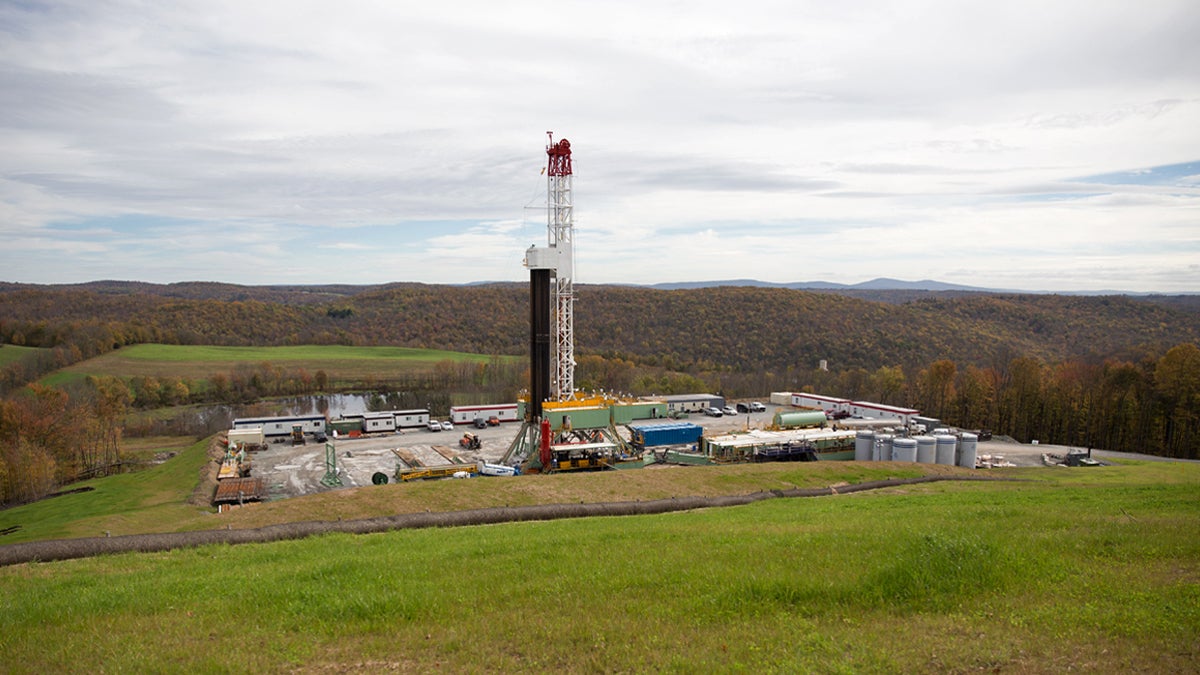Wolf’s gas severance tax proposal may be first step in elaborate political dance
Listen
A drill rig
Pennsylvania Gov. Tom Wolf made good on a campaign promise Wednesday, proposing a 5 percent tax on natural gas drilling to go into effect in 2016 and generate $1 billion in its first year. The announcement may represent the first step in an elaborate political dance.
Speaking in classroom at the Caln Elementary School in Thorndale, Chester County, Wolf told reporters the bulk of the revenue will go to funding education.
“This is about what we need to do as Pennsylvanians to serve this educational need that we all have,” he said. “We need to make sure that we are doing a good job and investing in our future by investing in education.”
The proposal is two tiered. It would tax 5 percent of the value of the gas coming out of the well head and then take an additional 4.7 cents per thousand cubic feet pulled out of the ground. This will be a hedge against fluctuations in the price of gas, Wolf said.
That second part is new, and Wolf said he based the entire package on the model used by Republican leaders in West Virginia.
Currently, Pennsylvania has a 3.5 percent local impact fee, which directs most revenue to the municipalities affected by shale gas extraction.
Both chambers of the Pennsylvania legislature are controlled by Republicans, and leaders of both issued swift messages denouncing Wolf’s idea. Senate Majority Leader Jake Corman has drawn a line in the sand, saying he won’t consider any new revenue options until lawmakers rein in growing state employee pension costs.
Leaders in the House claim Wolf’s plan will be bad for the state’s economy. Adding the 5 percent tax to the 4.7 cent charge per thousand cubic feet of extracted gas, they said, makes its a 7.5 percent tax.
Wolf’s team disputes that math, pointing to a report by Pennsylvania’s independent fiscal office that says adopting the West Virginia model would effectively make the tax rate 5.8 percent.
House Republicans also say Pennsylvania’s 9.99 percent corporate tax rate should be considered, noting that the cost of doing business in the commonwealth is already one of the highest in the country. They pointed to West Virginia’s 6.5 percent corporate tax rate and that Texas charges nothing, expressing a wariness of driving away the drilling industry, which has helped lower unemployment in the state.
Wolf, who said he supports lowering the state’s corporate tax rate, added that it’s nonsense that the gas industry will be scared away. He believes a severance tax will actually make drilling more popular.
“I think this is the best thing that could happen to the industry because it’s going to make all of us in Pennsylvania partners in the success of this industry,” Wolf said. “My argument to them is this is really smart, this is really good business.”
What follows will be a political dance, one that will pick up when Wolf delivers his first state budget proposal in the first week of March. From then until at least the budget deadline at the end of June, many things will remain in flux.
Wolf will attempt to balance a $2 billion deficit while advancing his shale tax plan. Republicans will demand pension reform and liquor privatization. If either side has hope of advancing its agenda, it’s going to take a whole lot of political skill.
WHYY is your source for fact-based, in-depth journalism and information. As a nonprofit organization, we rely on financial support from readers like you. Please give today.

